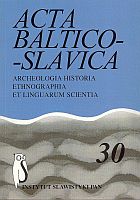Осушeствлeниe согласных в „мовe простой” как показатeлъ измeнeний в условиях контактов
The Realization of Consonants in “Mova Prosta“ as an Indicator of Changing Contact Conditions
Author(s): Björn WiemerSubject(s): Language and Literature Studies
Published by: Instytut Slawistyki Polskiej Akademii Nauk
Keywords: Belarusian; dialectology; dialect mixing / dialect levelling; contact linguistics; Baltic-Slavic region; Circum Baltic Area; phonetics / phonology; structural variation; multilingualism
Summary/Abstract: This article critically discusses the variation in the palatal vs. velar pronunciation of dental plosives and fricatives in the so-called ‘Mova Prosta’, an unduly poorly described Belarusian rural vernacular which must have arisen as a result of intensive and long-lasting contacts with speakers of Lithuanian and Polish, added in the last decades by heavy influences from Russian. The primary aim of the article is to demonstrate that, according to our knowledge of data up to date, a Lithuanian substratum of Mova Prosta has been retreating. To this goal data from three different periods are examined: end of the 19th century, the 1950s-70s, and the most recent time (1990-2004). The result of the analysis of data on the level of phonetics and phonology confirms the assumption that since the end of the 19th century the contact conditions for speakers of MP have changed. The data of MP from different regions where it is used are homogeneous with respect to the palatal—velar opposition and the phonetic realization of the palatal consonants under discussion. This is striking if we take into account the generally unstable character of most of MP’s structural peculiarities and the dynamics of their variation caused by different contact conditions (kinds of multilingualism).
Journal: Acta Baltico Slavica
- Issue Year: 2006
- Issue No: 30
- Page Range: 439-452
- Page Count: 14
- Language: Russian

